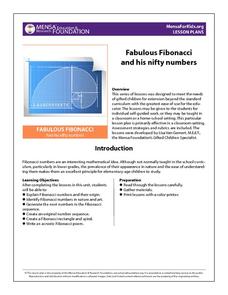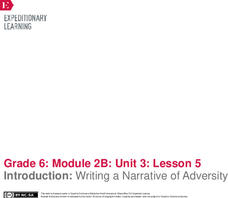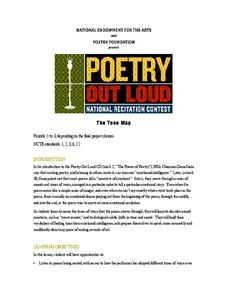Harper Collins
Every Thing On It Lessons and Activities
Honor the great poet, Shel Silverstein with eighteen activities and lessons showcasing his collection of poems from the book, Every Thing On It. Activities challenge scholars to rhyme words, make inferences, recite a poem, and more!
California Federation of Chaparral Poets, Inc
Poetic Devices
Have everything you need to know about the elements of poetry with a nine-page handout. Split into four categories—word sounds, meanings, arrangement, and imagery—budding poets may reference terms, read definitions, descriptions, and...
K12 Reader
Adding Alliteration to Poetry
Alliteration can make the language of a poem flow. Add adjectives to several blanks in two poems to form alliterative phrases.
MENSA Education & Research Foundation
Fabulous Fibonacci and His Nifty Numbers
Fibonacci numbers are not only found in the classroom but also in nature. Explore the concept of Fibonacci numbers through a series of lessons designed to gain insight into the mathematical reasoning behind the number pattern, and spark...
Nasher Museum of Art at Duke University
Are You My Mother? An Opinion Writing Unit
During a five-day lesson, scholars analyze written and visual art—primarily the poem, Mother to Son by Langston Hughes— identify facts, and write opinions. Learners read the poem several times, discuss, write, compare and contrast, and...
National Park Service
A Natural Resource Called Peace
Get your pupils outside and teach them about peace at the same time! Scholars create a list describing peace, hike outside, add to that list, and later create poems. The exercises support differentiation for your individual classes as...
EngageNY
Writing the Final Narrative: Monologue or Concrete Poem
Get inspired to help those creative juices flow. Using the resource, scholars write their final, best version of their narrative monologues or concrete poems. Next, they prepare for a performance task by watching and discussing a video...
K20 LEARN
Diggin' Deeper - Poetry Made Relevant: Poetry And Poetic Devices
What do Beethoven, Bob Dylan, and Pharrell all have in common? Works by these three musicians are used to launch a study of poetry. Class members listen to passages from the music and craft a quick write about how the music makes them...
K20 LEARN
Texture Poetry: The Great Gatsby and the Sense of Touch
To prepare for crafting a descriptive poem about a character in F. Scot Fitzgerald's The Great Gatsby, groups describe the texture of objects hidden in small bags. Individuals then select a character from the novel and an object...
EngageNY
Introduction: Writing a Narrative of Adversity
A little adversity is good for writing. Scholars review narrative-based monologues and concrete poems and choose which genre to use to express their own theme of adversity. Pupils also consider how to structure their narratives by...
K20 LEARN
Sweet and Savory Writing: Descriptive Writing
The engagement is in the details. Young scholars learn the benefit of weaving descriptive and sensory details into the fabric of their writing through the activities in this lesson. As their hands explore items concealed in bags, a...
Curated OER
The Imagine Poetry & Mural Lesson
Readers of all ages can work together in groups to create original poetry on the theme of "Imagine," inspired by John Lennon's classic song. They also create a mural to illustrate their poetry. A beautiful activity, inspired by a...
Curated OER
The Tone Map
Poems are meant to be heard. Hearing a poem being read enriches one’s understanding of the tone and mood of the piece. Introduce your class to the sounds of poetry with a packet that not only details how to use poetry recordings in the...
Curated OER
War Literature
Working in groups, young historians review a war poem written by Stephen Crane. After reviewing the poem, they present an oral interpretation of the poem and hold a panel discussion about their analysis. The panel is made up of five or...
Curated OER
Goals and Perseverance
Define the word perseverance to have learners understand why it is important in reaching goals. Young scholars research how Martin Luther King needed perseverance to accomplish his goals. They write acrostic poems using the word...
Curated OER
Exploring Race Through Literature
Provide your class with an opportunity to examine race through a variety of literary works. They read and analyze a chosen poem, interview, speech, or story describing race in America. They then use key words from the original work to...
Curated OER
Lesson: Paul Chan: 1st Light and 5th Light
Paul Chan's latest exhibit includes seven manifestations of light. Today, kids analyze the pieces 1st Light and 5th Light. They consider the concept of opposed or dualistic realities found in literature, society, and Chan's work. They...
Curated OER
Honoring Our Pets During National Pet Week
Recognize National Pet Week with reading and writing activities to celebrate the animals in your pupils' lives.
Curated OER
Ben Franklin Timeline
Celebrate inventions such as lightning rods, bifocals, and stoves with a Ben Franklin Day. Young historians conduct research and write a paragraph about an accomplishment of Benjamin Franklin including an illustration or collage that...
Curated OER
Magazine Production
Analyze magazines as a class, looking carefully for the target audience, advertisements, and topics presented. Small groups then work as a publication team and receive a magazine that they have to "sell." Each individual has a different...
Curated OER
Introduction to the Poetry Unit
Learners explore, analyze and interpret one form of poetry writing called Poetry Slam. They hear several examples of unexpected poetry and view a video of "Slam Nation." The books, "Hey You! C'mere: A Poetry Slam," by Elizabeth Swados...
Curated OER
Ladybug Poem
In this poetry worksheet, learners read the poem "Ladybug," color the picture, underline the rhyming words and then write the rhyming words on pages two through four.
Curated OER
October Acrostic
For this writing worksheet, students write an original acrostic poem about the month of October. Students begin each line with a word or phrase that starts with the letter on that line.
Curated OER
September Acrostic
In this writing worksheet, students write an original acrostic poem about the month of September. Students begin each line with a word or phrase that starts with the letter on that line.
Other popular searches
- Writing Poetry Onomatopoeia
- Writing Poetry Third Grade
- Writing Poetry and Prose
- Creative Writing Poetry
- Writing Poetry Rhyming Poems
- Descriptive Writing/poetry
- Writing Poetry Unit
- Writing Poetry Lesson Plans
- Poetry Writing Workshop
- Writing Concrete Poetry
- Writing Poetry On
- Teaching Poetry Writing

























